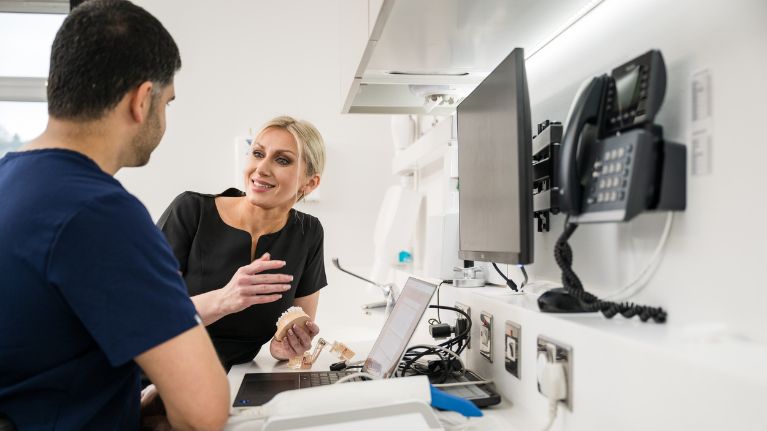ADI Register of Mentors

We have been helping mentees connect with mentors since 2005. The expertise and knowledge of our esteemed members is extensive and our 'match making' service aims to pair mentors with mentees. The guidance in these pages has been put together in cllaboration with CGDent, and can be downloaded in full here: Mentoring in Implant Dentistry: Good practice guidelines
Mentoring in Implant Dentistry: Good Practice Guidelines
Training Standards in Implant Dentistry has been accepted by the GDC as outlining the training required by a dentist wishing to undertake implant dentistry. The document states:
‘Before undertaking implant treatment, a dentist must develop competence in the procedures involved in clinical assessment, treatment planning, and the placement and restoration of implants. The skills and knowledge necessary for competence should be developed through a training course in implant dentistry, with a suitably trained and experienced clinician acting as a mentor’.
The Mentoring in Implant Dentistry: Good practice guidelines are the product of a joint initiative between the College of General Dentistry (CGDent) and the Association of Dental Implantology (ADI). The purpose of this guidance is to provide a clear and practical pathway of the mentoring process for both mentor and mentee in the context of training in implant dentistry. This guidance outlines the aims and benefits of mentoring, describes skills and qualities appropriate in those wishing to become mentor and mentee, and provides an insight into the process of mentoring. It complements and supports Training Standards in Implant Dentistry.
These guidelines have been endorsed by:
- Association of British Academic Oral and Maxillofacial Surgeons (ABAOMS)
- British Association of Oral Surgeons (BAOS)
- Foundation for Oral Rehabilitation (FOR)
- International Team for Implantology, UK and Ireland Section (ITI)
- Platform for Exchange of Experience Research and Science, United Kingdom and Ireland (PEERS)
What Is Mentoring?
One definition of mentoring comes from the Standing Committee on Postgraduate Medical and Dental Education (SCOPME) report of 1998. The report defined mentoring as ‘a process whereby an experienced, highly regarded person (the mentor) guides another individual (the mentee) in the development and examination of their own ideas, learning, and personal and professional development’.
Because the purpose of the CGDent/ADI guidelines is to assist a practitioner in developing specific clinical skills, we are defining mentoring as a process whereby a dentist undertaking training in implant dentistry (the mentee) is guided by a suitably trained and experienced practitioner (the mentor) to develop the clinical skills required to carry out implant dentistry, as well as an exploration of the mentee’s ideas and learning.
The mentoring process will be an essential part of the overall training that is required to gain competency in carrying out implant dentistry. We recognise some overlap in this document between the terms ‘mentoring’, ‘teaching’, ‘training’ and ‘coaching’.
Why Is Mentoring Required In Implant Dentistry?
The CGDent and the ADI advocate that mentoring is an essential part of the development and training of every dentist who wishes to practice implant dentistry. It is considered good practice to seek a mentor to improve one’s skills, and to act as a mentor to take further responsibility and to help less experienced colleagues. The extent and nature of the mentoring relationship will depend upon the baseline level of competency of the mentee and the level to which they wish to aspire.
It is usually expected that the skills and knowledge necessary for competence in any new technique should be developed by the trainee through the following path, as outlined in Training Standards in Implant Dentistry:
- Attending an appropriate training course
- Undergoing a process of mentoring
- Having documentary evidence of training, including a logbook of clinical activity
The process of mentoring helps both mentor and mentee develop new approaches and skills and provides an opportunity for reflection on the work and treatment provided. Mentoring consolidates professional standards and values, which improves delivery of patient care and safety